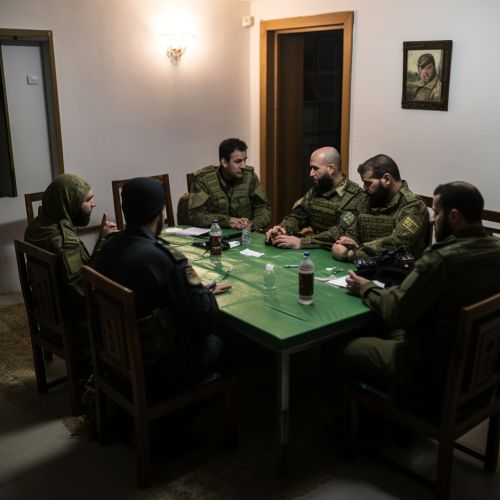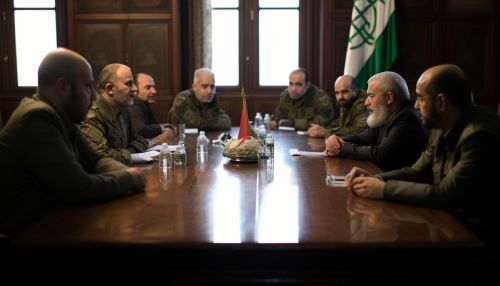Hamas
Origins and Formation
Hamas, an acronym for 'Harakat al-Muqawamah al-Islamiyyah' or the Islamic Resistance Movement, is a Palestinian Sunni-Islamic fundamentalist organization. Established in 1987, it has its roots in the Muslim Brotherhood, a transnational Sunni Islamist organization founded in Egypt by Islamic scholar and schoolteacher Hassan al-Banna in 1928. The formation of Hamas was largely a response to the socio-political environment in the Gaza Strip and the West Bank during the First Intifada, a Palestinian uprising against Israeli occupation.
Ideology and Goals
Hamas follows a radical form of Sunni Islamism, which is a political ideology based on the belief in the Islamic religion as a guide to governance. The organization's 1988 charter, or 'Covenant', calls for the replacement of the State of Israel with a Palestinian Islamic state in the area that is now Israel, the West Bank, and the Gaza Strip. However, in 2017, Hamas issued a new political document, which accepted the 1967 borders as a basis for the establishment of a Palestinian state but did not recognize Israel.
Structure and Leadership
Hamas has a unique structure that consists of a political bureau, a Shura council, and various departments responsible for different aspects of governance and military operations. The political bureau, currently headed by Ismail Haniyeh, is the highest decision-making body in Hamas. The Shura council, on the other hand, is responsible for policy formulation and decision-making on major issues.


Military Wing and Tactics
The 'Izz al-Din al-Qassam Brigades' is the military wing of Hamas, responsible for carrying out armed attacks against Israel. The group has used various tactics, including suicide bombings, rocket attacks, and tunnel warfare. The use of these tactics, particularly suicide bombings, has led to Hamas being designated as a terrorist organization by several countries and international organizations, including the United States, the European Union, and Japan.
Political Role
Despite its military activities, Hamas also plays a significant political role in Palestinian society. In the 2006 Palestinian legislative elections, Hamas won a majority of seats in the Palestinian Legislative Council, effectively making it the governing body of the Palestinian National Authority. Since then, Hamas has governed the Gaza Strip, while the West Bank is governed by the rival Palestinian faction, Fatah.
International Relations
Hamas's relationship with other countries and international organizations is complex and varies widely. While it has been designated as a terrorist organization by several Western countries, it also has political and financial support from countries such as Iran, Qatar, and Turkey. Its relationship with other Palestinian factions, particularly Fatah, has been characterized by periods of conflict and reconciliation.
Criticisms and Controversies
Hamas has been criticized for its use of violence and its refusal to recognize the State of Israel. It has also been accused of human rights abuses, including the use of child soldiers, and the repression of political dissent in the Gaza Strip. These criticisms have led to international isolation and have complicated efforts to resolve the Israeli-Palestinian conflict.
